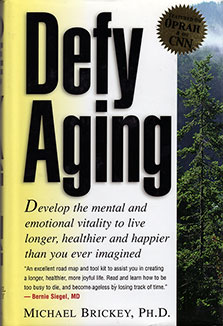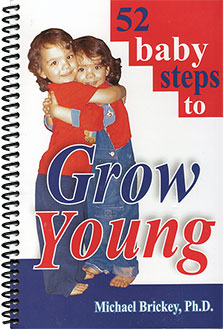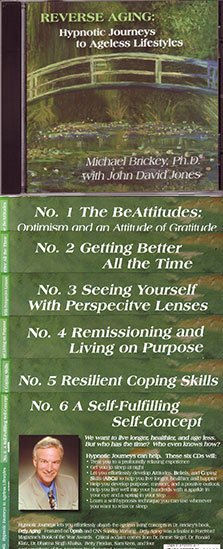The Defy Aging Newsletter
Anti-aging psychology, holistic health, and wellness
These are archives of a biweekly e-mail newsletter for helping you think, feel, look, and be more youthful and live with purpose.
September 13, 2007 Number 172
This issue:
Lifecare Communities
ACTION TO TAKE
Learn more about residential options for seniors.
WHY
Like going on a vacation? What if you could live in a resort for the rest of your life? I recently had the great pleasure of giving the keynote speech at Peconic Landing’s fifth anniversary celebration. Just a few miles from the Hamptons on Long Island, Peconic Landing is a premier “lifecare community” (also known as a continuing care retirement community).
Peconic Landing has beautiful apartments and cottages overlooking the ocean. Amenities include a heated swimming pool, tennis courts, and dozens of classes--most taught by the residents.
Frankly I wondered if it would have an elitist club atmosphere. Instead, I found residents had quite diverse backgrounds, lifestyles, and interests. They were very open, friendly, mutually supportive, and shared a strong sense of community. They were very pleased with the community and their choice to live there. Some did volunteer work in the city. Some had become accomplished artists since coming there. And some were very into athletics and outdoor activities. They even had a synchronized swim team.
I’m against retirement if it means just taking it easy the rest of your life. This wasn’t that kind of retirement. Most residents were on several committees and lamented that there wasn’t enough time to do all the things they wanted to do.
Peconic Landing was a harbinger of dozens of such facilities popping up around the country. As with owning a condo, maintenance is taken care of. Residents also have one meal a day in one of the dining rooms. We are talking grommet dining.
The lifecare refers to the community’s commitment to provide assisted living or nursing home care, if needed, at the same the monthly fee residents pay for independent living. This attenuates the fear of declining health or illness causing a resident to run out of money. It also prevents the life disruption of having to move to a new, strange facility if health declines.
Some earlier retirement centers had insubstantial funding and went bankrupt. Many states now heavily regulate retirement communities and require substantial cash reserves.
Different facilities for seniors have different financial arrangements. The enrollment fee may be a few thousand dollars, a fee to cover lifecare services ($35,000 in Peconic’s case), or six figures for the residential buy in. Some facilities guarantee residents can withdrawal most of their initial investment if they leave. A few facilities have a six figure cost upfront in exchange for care the rest of the resident's life. Peconic Landing’s “equity-based” approach is fairly unique in that residents purchase their apartment or cottage and receive the tax benefits of home ownership. Later they or their heirs can sell the home (hopefully at an appreciated price).
So is this for everyone? For most people the home they have lived in for decades is home and they want to live there as long as possible. For some living with family works well. In either instance there may be a strong desire to be connected to the larger community and interact with people of all ages. Fortunately, home health services, homemaker services, and meals on wheels are increasingly available to help seniors stay at home.
I think lifecare facilities are best suited for community minded people who want to be with friends daily and be in a stimulating environment with lots of resources. People who generally keep to themselves in their rooms would miss out on many of the unique benefits. Lifecare facilities also offer freedom from the hassles of home maintenance and shuttle buses for those who do not drive. Of course the lifecare part offers the previously mentioned benefits in the event of declining health.
The costs are within reach of many middle class individuals and couples. The costs do tend to select for well educated and/or achievement oriented individuals. This in turn results in a more achievement oriented, learning oriented community than is typically found in independent living or assisted living.
Any time one is choosing a facility, the quality of the staff and the meals is critical. That is best assessed by multiple visits.
In conclusion, lifecare communities are a very welcome option for seniors who are choosing where and how they want to live.
Quotes
A community needs a soul if it is to become a true home for human beings.
~Pope John Paul
There’s no place like home.
~Dorothy in the Wizard of Oz
Humor
Home is where you hang your head.
~Groucho Marx
Reprint this article from:
THE DEFY AGING NEWSLETTER
Anti-Aging Psychology
Holistic Health and Wellness
This newsletter article may be reprinted in E-zines, newsletters, newspapers, and magazines provided the content is not edited and the attribution below is given. Formatting may be changed and you may use one of the web site pictures of the author to accompany the article.
"Dr. Michael Brickey, The Anti-Aging Psychologist, teaches people to think, feel, look and be more youthful. He is an inspiring keynote speaker and Oprah-featured author. His works include: Defy Aging, 52 baby steps to Grow Young, and Reverse Aging (anti-aging hypnosis CDs). Visit www.NotAging.com for a free report on anti-aging secrets and a free newsletter with practical anti-aging tips."






